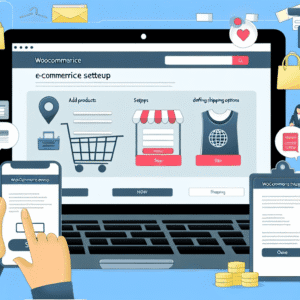In recent years, blockchain technology has gained significant attention around the globe. Often associated with cryptocurrencies like Bitcoin, blockchain is more than just a financial innovation. It possesses the potential to transform various sectors, particularly among Small and Medium Enterprises (SMEs) in Nigeria. With SMEs being the backbone of Nigeria’s economy, adopting blockchain could be a game-changer. This article unveils how blockchain can empower Nigerian SMEs, enhancing their efficiency, transparency, and growth prospects.
Understanding Blockchain
Before we delve into its implications for Nigerian SMEs, let’s clarify what blockchain is. At its core, blockchain is a decentralized system that records transactions across multiple computers in a way that prevents retroactive changes. This ensures that data integrity is maintained, and all participants can access the same information, resulting in greater transparency.
The Current Landscape of Nigerian SMEs
Nigeria’s economy thrives on the contributions of SMEs, which account for approximately 96% of businesses and over 84% of employment. However, these enterprises face several challenges, such as limited access to finance, high operating costs, inadequate infrastructure, and issues with trust in transactions. Addressing these challenges is crucial for their growth and the overall economy.
How Blockchain Technology Can Help
1. Enhanced Transparency and Trust
One of the most significant barriers faced by SMEs is the lack of trust in transactions. Blockchain’s inherent transparency allows every transaction to be recorded and verified by all participants within the network. This drastically reduces the potential for fraud and builds trust among business partners, customers, and stakeholders.
For instance, a Nigerian farmer could use blockchain to trace the journey of his products from farm to table, demonstrating their quality and authenticity. Consumers would have more confidence in purchasing these products, potentially increasing sales and allowing farmers to command higher prices.
2. Access to Finance
Accessing finance is one of the most significant hurdles for SMEs in Nigeria. Traditional financial institutions often require extensive documentation and collateral, which many businesses lack. Blockchain can provide alternative financing methods, such as decentralized finance (DeFi) platforms. These platforms allow SMEs to access loans or investments based on smart contracts without the need for intermediaries, making funding more accessible.
For instance, a business could issue tokens representing a share in their company. Investors could buy these tokens, providing needed capital while receiving a stake in the business.
3. Streamlined Operations
Blockchain can also enhance operational efficiency for SMEs. By automating processes through smart contracts—self-executing contracts with the terms written into code—businesses can reduce administrative costs and minimize human error.
For example, a logistics company can use smart contracts to automate insurance payouts in case of delivery delays, ensuring faster resolutions and better customer service.
4. Improved Supply Chain Management
The Nigerian supply chain often grapples with inefficiencies, making it challenging for SMEs to monitor their products’ journey. With blockchain, every step in the supply chain can be tracked transparently—from raw materials to final delivery.
This enables SMEs to verify the authenticity of their products, track inventory in real-time, and even manage returns more efficiently. It also provides valuable insights into consumer behavior and preferences, allowing for better stock management and tailored marketing strategies.
5. Global Market Access
Leveraging blockchain can help Nigerian SMEs expand their market reach. For businesses, the capability to engage in international trade without the complexities of currency exchange and payment processing through traditional banks is a significant advantage.
Blockchain platforms often allow for easy conversions and transactions with different cryptocurrencies, making it less expensive and simpler for SMEs to sell their products globally.
6. Enhanced Data Security
Cybersecurity is a paramount concern for any business. For SMEs, a data breach can be devastating. Blockchain’s decentralized nature provides an extra layer of security. Each transaction is encrypted and linked to the previous one, making it virtually impossible to modify or hack.
This security not only safeguards sensitive business information but also ensures customer data protection, fostering loyalty and trust.
7. Regulatory Compliance
For SMEs operating within Nigeria, navigating the complex regulatory landscape can be daunting. Blockchain can simplify compliance by offering transparent records that can easily be audited.
From tax reports to labor laws, having structured, tamper-proof records can save SMEs significant time and resources in compliance processes. Additionally, by employing blockchain, businesses can demonstrate their commitment to transparency and ethical practices, further enhancing their reputability.
FAQs
1. What is blockchain technology?
Blockchain is a decentralized digital ledger that records transactions across multiple computers in a way that makes it impossible to change retroactively.
2. How can blockchain benefit Nigerian SMEs?
Blockchain can enhance transparency, improve access to finance, streamline operations, enhance supply chain management, secure data, and simplify regulatory compliance.
3. Is blockchain only applicable to the finance sector?
No, while it’s known for its use in finance, blockchain has applications in various sectors, including agriculture, logistics, healthcare, and more.
4. How can I implement blockchain in my SME?
Begin by assessing your business processes to identify areas where blockchain can add value. Consider consulting with experts or using blockchain services tailored for SMEs.
5. Are there any risks involved with using blockchain?
Like any technology, there are risks, including regulatory challenges and the necessity for proper implementation. However, the potential benefits often outweigh these risks if adequately managed.
Conclusion
The implementation of blockchain technology offers immense potential benefits for Nigerian SMEs. As the landscape continues to evolve, those who adopt this innovative approach will be better positioned to enhance their trustworthiness, streamline operations, and tap into new markets.
If you are an SME looking to unlock your potential, explore the advantages of blockchain technology and take the next steps toward transformation.
Call to Action
At Nikenga Web Services, we specialize in managed hosting, marketing, and development tailored for SMEs. Discover how our expert services can help you implement cutting-edge technologies like blockchain and drive your business toward success. Contact us today!







